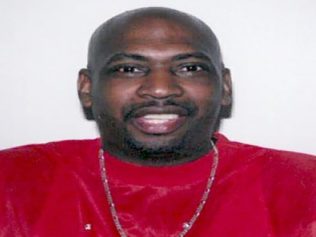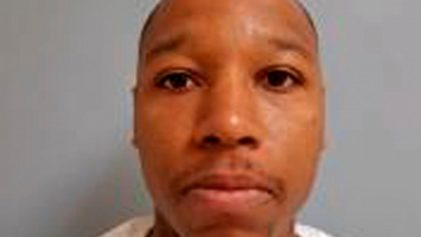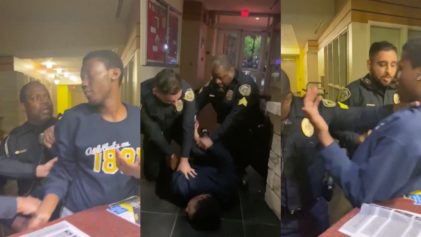
Source: Wikipedia
Under the Trump administration, the slogan “Blue Lives Matter” is a matter of official policy. The term has been used by white law enforcement and their supporters, reflecting a white reactionary response to Black Lives Matter and the protest movement against police violence. Now, the mantra takes on new meaning under a new “law and order” White House.
One of the Trump executive orders increases penalties for people who “commit or attempt to commit crimes of violence against federal, state, tribal and local law enforcement officers.” Under the measure, U.S. Attorney General Jeff Sessions will develop a strategy to prosecute those who assault police officers and work in coordination with state and local governments. The Justice Department will also make recommendations on new federal laws and mandatory minimum sentences.
The second order establishes a task force on crime reduction and public safety, which will create strategies to reduce crime, particularly illegal immigration, drug trafficking and violent crime. The task force, which will be established by the Attorney General, will propose new legislation and submit at least one report to President Trump within the coming year.
The third executive order, intended to fight international drug cartels, calls for federal agencies to increase the sharing of intelligence with police agencies. “Transnational criminal organizations and subsidiary organizations, including transnational drug cartels, have spread throughout the nation, threatening the safety of the United States and its citizens,” the order states. “A comprehensive and decisive approach is required to dismantle these organized crime syndicates and restore safety for the American people.”
Law enforcement and civil rights experts say the executive orders are consistent with the goals of the Fraternal Order of Police, which endorsed Trump in the election. The FOP issued “The Trump Administration: The First 100 Days,” a list of recommended actions the president should take. For example, the FOP has urged Trump to reverse the ban on racial profiling by federal agencies, repeal Obamacare, restore the use of private prisons by the federal government, enact hard-line anti-immigration measures and scrap the recommendations made by President Obama’s Task Force on 21st Century Policing.
The support of the FOP notwithstanding, law enforcement and civil rights groups alike have come out against the executive orders. For example, Law Enforcement Leaders to Reduce Incarceration, a group consisting of over 200 current and former police chiefs, sheriffs, federal and state prosecutors, and attorneys general, criticized the president’s measures. The group, led by Dallas Police Chief David Brown and former Superintendent and Police Chief Ronal Serpas, said in a report that today’s policies too often rely on jail and prison, and are ineffective in maintaining public safety. “We need not use arrest, conviction and prison as the default for every broken law. For many nonviolent and first-time offenders, prison is not only unnecessary from a public safety standpoint, it also endangers our communities.”
“President Trump intends to build task forces to investigate and stop national trends that don’t exist. We have seen historic lows in the country’s crime rate and a downward trend in killings against police officers since the 1980s,” said Jeffery Robinson, deputy legal director of the American Civil Liberties Union and director of the Trone Center for Justice and Equality, in a statement. Robinson said task forces based on misinformation are not the answer. “The president not only doesn’t acknowledge these facts about our nation’s safety, he persists in ignoring the all-too-real deaths of Black and brown people at the hands of law enforcement.”
“Basically, he is falling in line with the issues of the FOP and it’s really unfortunate,” Damon K. Jones, New York representative of Blacks in Law Enforcement of America told Atlanta Black Star. Jones, whose organization opposed the FOP endorsement of Trump, said that the stricter laws for officer assaults will cover up police brutality cases. “A lot of the time, you have resisting arrest, obstructing of officers’ duties and even minor assaults on police officers. And when you look at the police brutality cases, those are the most common charges they get,” Jones added, noting that now people will be subjected to even stricter charges and forced to take a plea deal if they are poor and unable to afford an attorney.
“The police are trained to justify their actions,“ Jones said, which includes falsifying police reports. However, courts do not hold these officers accountable for their misconduct. “That is another hurdle and, unfortunately, the FOP has large lobbying power. In some states, they are the union with the collective bargaining power and in other states they are fraternal,” he said, lamenting that the Black police associations don’t have an effective counter to the power of the FOP.
Citing Trump’s halting of the Department of Justice consent decrees for Chicago and Baltimore, Jones portends bad news for Black communities in the Trump administration. “They’re going to rain hell in Black communities and immigrant communities,” he said of the police emboldened by Trump. “I think Back people are going to be in for a rude awakening when it comes to policing in their communities. It’s going to get worse,” he added. Jones also believes Black people must focus on building firewalls, providing police accountability and taking control of the politics in their communities. This includes residency requirements for police officers—which Jones says is crucial for community policing yet the FOP opposes—and instituting a civilian complaint review board.
Black elected officials often provide an obstacle to enacting these reforms, Jones insists. In addition, righteous Black officers are in short supply. “There’s not enough of Black police or law enforcement that will speak out. The conscious ones are the minority,” he noted, identifying a disconnect between the older generation of officers who came from the civil rights movement and the Nation of Islam, and the new recruits. “These new officers are disconnected with the struggle and are more concerned about making money and overtime,” he noted. “You’re already outnumbered when you go through the academy, and then you’re brainwashed. Cats like me who have organizations, they tell them, ‘Don’t join them, they’re racist.’”
Nonetheless, as Trump signs his executive orders and assumes a “tough on crime” stance towards Black America, Black people must fortify and take control locally. “The Trump administration will be a law and order administration,” according to the White House website. “The dangerous anti-police atmosphere in America is wrong. The Trump Administration will end it.” It will take a movement to turn this assault on Black people around.


